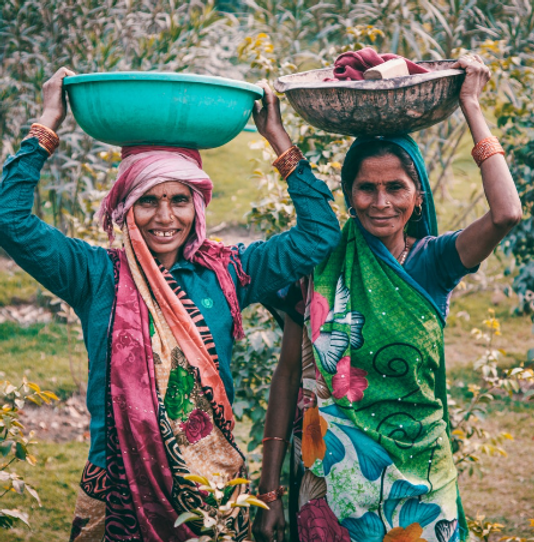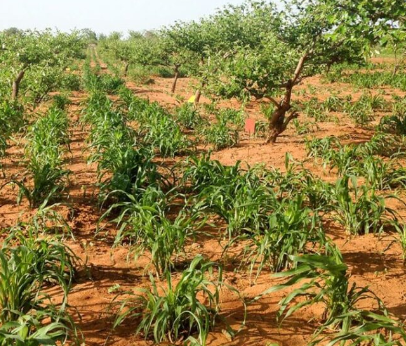Over the years, the frequency of droughts in Maharashtra State in India has increased, harming crops and putting farming families into debt. Fed up with droughts, women farmers from Shirala village have begun looking for alternative farming activities to provide more sustainable and regular income for their families.

Photo: Palladium
Better Together
Mrs. Shobha Gavhane is one of these women, and has recruited 12 women in her village to take part in “group farming” training by the government of Maharashtra’s Agri-Skilling Program. Most women from Shirala own very small plots of land – the result of the division of land through families over generations. “Group farming” brings together multiple farmers with small plots, who, when working together, reap more benefits than when farming individually on their single pieces of land. In groups, farmers are able to share equipment, pull their resources together to purchase more expensive items, and use their greater bargaining power to buy and sell inputs, all to produce at better prices.
“I was aware of the concept of group farming,” Mrs. Gavhane explains, “and when I was approached about the training, I immediately decided to participate and also mobilised other women from the village.”
After being certified in group farming, the Shirala women farmers joined forces to explore how to improve their incomes. They then met Palladium’s Business Advisory Services (BAS) team. The team convinced them to take the next step and form a “Famer Producer Company.” By registering as a company, the women have access to various government schemes, including loans for smallholder farmer groups.
The BAS team also helped the women choose poultry as their joint business, drawing from the majority of the members’ experience with household poultry. With the team’s help, the women then created a formal, financially sound business plan. The plan was submitted to a Maharashtra State government-owned company that provides loans to farmers, and the women became one of the first groups to receive a loan under a new government scheme. One of the pre-requisites for receiving this loan is that the company maintains a balance of INR 1 lakh (about USD 1,400) in its account. Although all the Shirala women are either small landholders or daily-wage earners, the women have decided to pool their money to reach this requirement. Some are giving INR 10,000 (about USD 140), and others are willing to sell their goats or find other loans to participate in the company’s pool.
Fighting Gender Norms
lthough these women are striving to achieve financial independence, rural Maharashtra is still a male-dominated society. Men are generally not willing to let women to work independently or operate outside conventional roles.
“My family has always been supportive of me working with [a women’s empowerment organisation], self-help groups, and other farmer organisations,” explains Mrs. Gavhane. “But men in rural areas are not educated and don’t let women operate outside traditional roles. If we want to encourage women to participate in business activities and promote women’s empowerment, it is imperative to give them necessary information and spark their interest in commercial activities.”
Social conditioning has also resulted in women themselves being unsure about their abilities to take on challenges independently and to grow. But the Shirala group members feel that if other women are made aware of the various government schemes and the benefits they can receive by engaging in business activities, they would be encouraged to take small risks. This could catalyse a big change in improving their socio-economic conditions. “I hope that other women will be encouraged by what we’ve been doing,” Mrs. Gavhane says, “and will strive to be financially independent and contribute to the socio-economic growth in Maharashtra.”
The Maharashtra Agri-Skilling Program is implemented under Pradhan Mantri Kaushal Vikas Yojana, the flagship scheme of the Ministry of Skill Development and Entrepreneurship (MSDE), Government of India, and funded by the National Skill Development Corporation (NSDC). At the state level, the Maharashtra State Skill Development Society (MSSDS) is the Project Implementation Agency (PIA) for this mass-skilling intervention, and the training program is being implemented under the Chhatrapati Rajaram Maharaj Entrepreneurship and Skill Development Mission.
The Agriculture Skill Council of India (ASCI) has developed the curriculum and assessment framework for the program and the Maharashtra State Council for Vocational Training (MSCVT) is entrusted with farmer assessment and certification. The MSSDS has appointed a consortium between SIMACES Learning LLP and Palladium as training partners to design and deliver farmer training and facilitate undertakings for Farmer Producer Organisations.
This article was originally published by Palladium.

